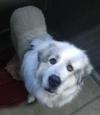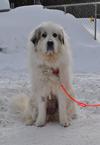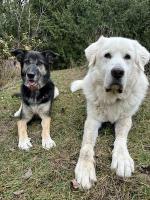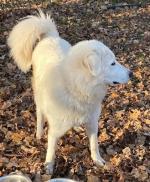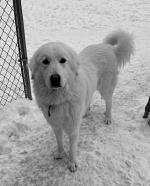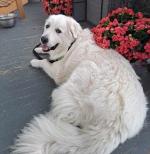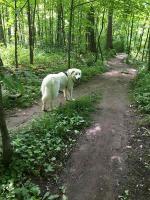Plume - Courtesy Posting

*ADOPTED*
DOB: Approx. February 2017
Plume is a stunning girl but comes with a couple of issues. She has to live outside with protection from the elements with an insulated dog house since outside is all she has known. You are welcome to work with her to live inside but she will become extremely stressed. Perhaps very very gradually this may work. She is also an incessant barker. This can also be worked with to some degree but her new people have to be willing to take the time with positive-reinforcement.
We think she may do well as a guardian dog on a hobby farm. There is no guarantee she won’t bark incessantly but she would, then, have a job to do.
This is Plume’s story from the SPCA Laurentides Labelle where she is residing right now:
Plume was first brought to us because the owner had received many complaints for her barking, and didn't know what to do. Plume refused to stay indoors because she has lived outside her entire life. She kept scratching the door, barking, lost appetite, etc….
She was adopted after only a few days with us by a couple who were present at home a lot, wich led us to believe we had found a good match. Unfortunately she came back after a couple of weeks for the same reason she was abandoned the first time.
We then started to look for another family right away because she seemed depressed in the kennel, and started losing weight, again but she was already too thin. We found another couple who had already had a couple of Pyrenees before and knew the breed well. They also had a lot of time to take care of Plume and were confident it would work out fine.
They called us after 3-4 days because they had a question about the food. They told us that she had not barked once so far and was staying on the deck and spending more and more time in the house. (Know that dogs won’t be themselves in a new home for at least a few weeks so not barking is normal until she gets to know her new family and home.)
They called us again after 5 days because Plume had started to bark non0stop and completely refused to go back inside. They had received complaints from the neighbours. They wanted to bring her back but couldn't get her in the car. My colleague and I went to pick her up.
Soon after Plume started to show some signs that something was really wrong. She seemed even more stressed than usual, had a round back, difficulty walking, trying to be sick but nothing would come out. We took her to the vet and our suspicious were confirmed, Plume had a stomach torsion. She was operated right away and she had a gastropexy to make sure it would not happen again.
Name:Plume
Age: 2 yrs old
Gender: Female
Spayed: Yes
Medication: Gabapentin, Metronidazole. We are also doing tests to find a good medication for her anxiety. She is on Fluvoxamine for the moment.
They are beautiful dogs with great temperaments given the right breeding, socialization, care including diet and training. Dogs are a lifelong commitment.
BARKING: They bark more than most dogs and neighbours do complain. That is a common reason for people surrendering their Pyrs (they didn’t do their research). Their bark is what deters predators and it is instinct to them. That and marking their territory. To take away their bark is to take away who they are. The barking can be managed but it takes time, patience and consistency with positive-reinforcement training. If you don’t like barking, they are not the dog for you.
CONTAINMENT: Pyrs love to hang out outside and their instinct is to wander. Therefore, they require at least a 6-foot secure fence in a large yard in which they can play, run and watch over. Some have been know to scale any height of fencing. No tie outs for these guys. It can lead to aggression since they cannot fully watch over their territory. If they are out all day, as they usually prefer when the family is home, they need shelter from the elements. And, no shock collars or invisible fencing.
DIGGING: They dig holes in your garden to stay cool in summer so you’ll want to set aside some garden for them.
DIET: Raw is the species-appropriate diet. Do not feed what they are guarding. Start them out on one protein until they are used to it and gradually add another. Raw food primer. A good www.facebook.com/groups/RawRoundupWithDNM/Raw Roundup facebook page to join.
DOGS: If you want more than one dog in the home or working, we always recommend two dogs of the opposite sex. Two males or two females do not always see eye-to-eye and fights will ensue in most cases, but not all.
EXERCISE: They require regular walks, of course, so they get out and see the world to keep them interested in life. They must be leashed because they will wander. Again, they have been specifically bred to wander with sheep as they watch over them.
GROOMING: Working and companion dogs must be groomed. They require a good weekly grooming to keep them mat free and their skin healthy (hence, pain free from the pulling of mats as they move), and cutting their nails including their dew claws every couple of weeks to a month. NEVER have their dew claws removed. This is a barbaric practice. Simply keep the dews trimmed.
They molt twice a year and shed all year round so your vacuum stays full. NEVER shave a Pyr. Their coats keep them cool in summer–they lose their undercoat, leaving just guard hairs–the guard hairs protect your dog from sunburn and insulate him against heat, as well as allowing air to circulate to keep the skin cool–and warm in winter–their undercoat grows close to the skin to keep your dog warm and dry. This system only works if you groom your dog regularly. If you don’t like grooming, take your dog to a master groomer. If you don’t want to, this isn’t the dog for you.
MICROCHIP: Make sure to chip your dog at the local shelter or at your vet so that if he accidentally wanders off, you will be found. Also, ensure he has proper ID on his collar.
NEUTER/SPAY: Make sure to neuter/spay your dog at the appropriate age which can be between one to two years old. Until that time, be responsible and do not allow any breedings. Leave breeding to the experts. Shelters are already full of unwanted dogs. Our dogs are neutered and spayed when they come into our care.
TRAINING: They require socialization and handling by many many people as pups by the breeder to be continued by their new people. They also require positive-reinforcement training. Pyrs, nor any dogs, take kindly to any kind of punishment.
It’s important to work with dogs as if in a dance and you are leading. Rewards for good behaviour and redirect for unwanted behaviour. It’s up to you to make them a good canine citizen. When engaging a trainer, ensure they use positive-reinforcement training to show you how to manage your dog. If you are not ready to train a dog, this is not the dog for you.
To train a Pyr is not like training some other breeds. They are not eager-to-please and just as soon walk away from you than do as you say. They were bred by man to be used as guardian livestock dogs because they do not require human intervention to tell them how to do their job. Lots of patience, consistency and time is required to work with them. If you want an obedient dog, this is not the dog for you.
WHY ARE THEY SURRENDERED: There are those in need of a home because someone didn’t realize they would get so big, bark so much, leave so much hair in the house, wander, and require work.
It is very important to do your research on any breed before deciding if they are a good match for your family. Please start here:
The Great Pyrenees.
Regarding dogs and children. We never want to see these dogs fail so it’s important that children learn how to behave with dogs and that parents never leave their children alone with a dog. Here is a link on that subject:
Children and Dogs.
If you are interested in Plume, please contact the SPCA at 819-326-4059.
Return to Post A Happy Tail 2019.
Breaking News
-
Courtesy - Bear
Apr 09, 25 09:09 AM
Bear DOB: October 2018 Location: Midland, Ontario Pyr/Maremma? mix Single family home with a large securely-fenced property or a hobby farm. Purchased/adopted -
Courtesy Post - Willow
Apr 09, 25 09:07 AM
DOB: March 26th, 2022 Location: London Ontario Cross Pyr/Collie Obtained her privately through a friend. How long have you had her? 10 months Spayed -
Lucy
Apr 09, 25 09:06 AM
*Foster-to-Adopt* or *Foster* DOB: January 3, 2024 Location: Acton, Ontario She will need a single-family home with a securely fenced yard of at least -
Remi
Apr 09, 25 07:44 AM
Location: Acton, Ontario DOB: February 2024 This sweet white fluffy Remi has a sad story. Remi, while his family was in the midst of moving, escaped and -
Grieving Dog
Apr 04, 25 06:17 PM
Background: I am seeking some feedback if anyone has had experience with bonded pairs. Thank you! We have been fortunate to love 2 x almost 10 year -
Leo
Mar 12, 25 06:32 AM
*ADOPTED* DOB: September 2023 (almost 1.5-years-old) Location: Acton, ON Single family home with a securely fenced yard required. This sweetheart was -
Buster
Mar 10, 25 03:36 PM
*Buster is going back to his original family as things have brightened up in their lives and he'll have a wonderful life on acreage.* Buster had to come -
Courtesy - Maya
Jan 08, 25 05:35 PM
*ADOPTED* Location: Dunnville, ON DOB: Jan. 3, 2021 (3.5 years) Spayed Companion Dog, Pyr mix Good with children. Single family home. Raw diet (species-appropriate)





